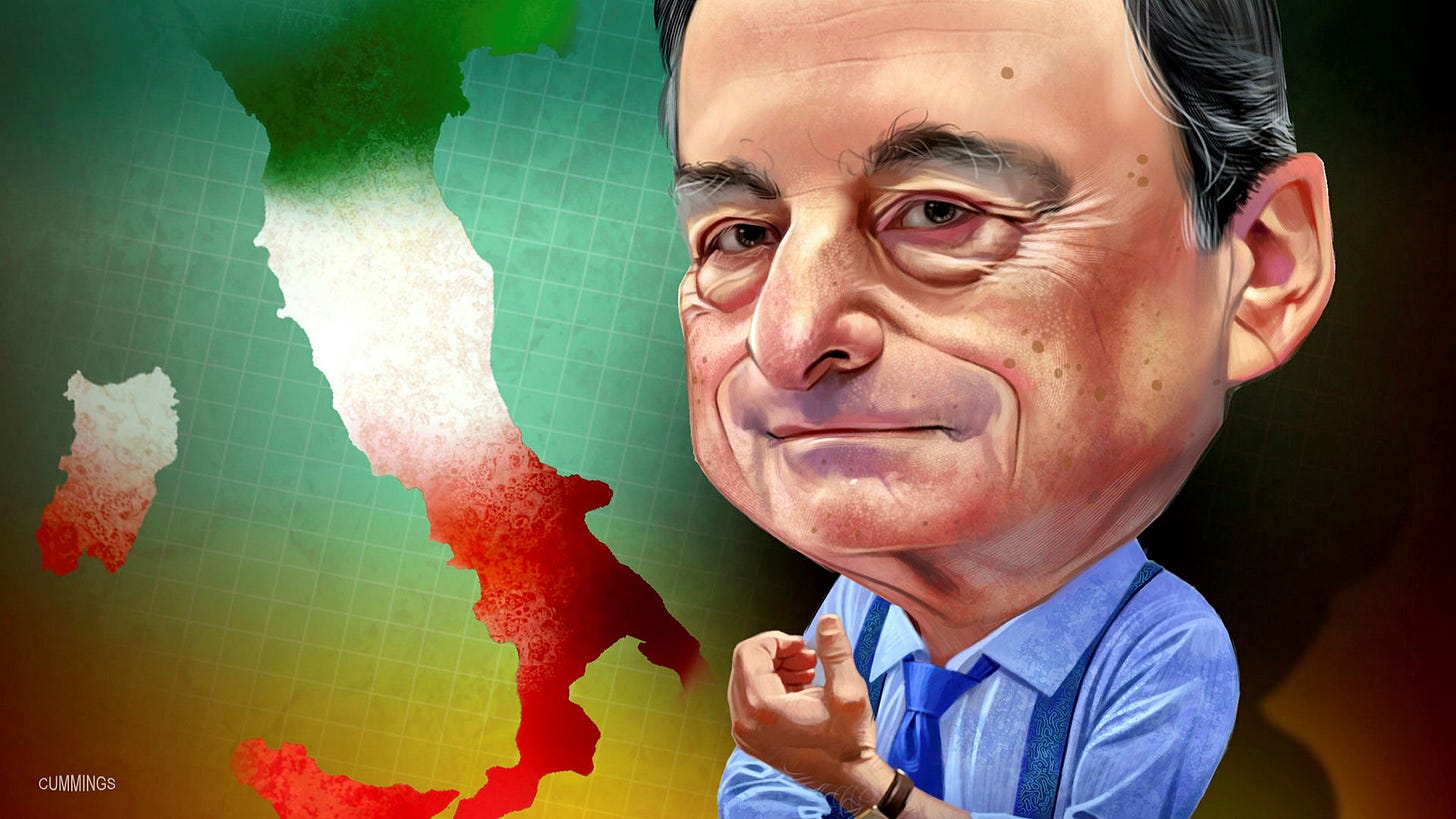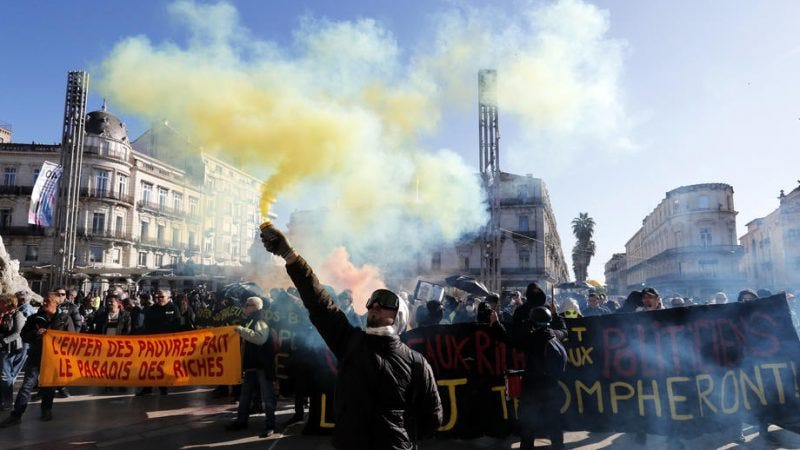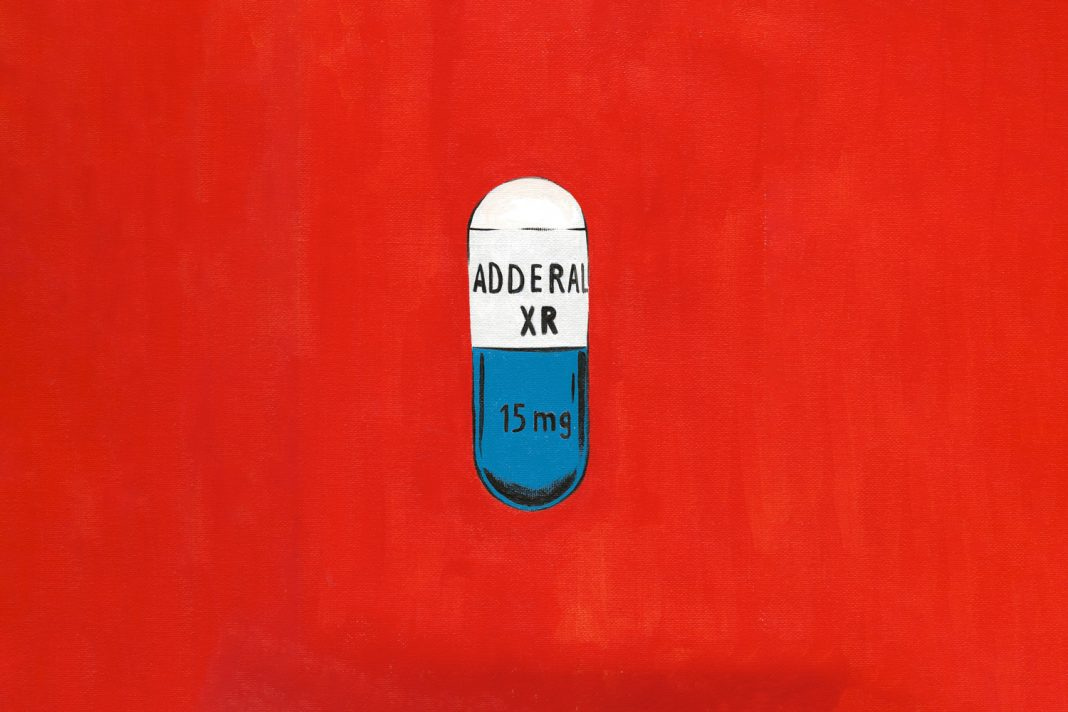Saturday Commentary and Review #90
The End of Technocracy in Italy?, A Monkeypox Primer, Banks Prepare For Global Civil Unrest, War in Ukraine Update, Los Angeles: Powered by Adderall
Having defused the Trump Administration by way of internal subversion and external hysteria, there was a brief moment in the West where political elites felt that they were turning back the tide of populism that had been growing since the 2008 Financial Crisis. Yes, #Brexit happened. And yes, Fidesz and PiS remain in power in Budapest and Warsaw. But BoJo easily tamed the populist wing of the UK Conservatives, and Macron fought off challenges from Marine Le Pen, while the Germans thanked Merkel for her service by choosing to allow the SPD to form a coalition government with the suicidal Greens. All was going well for a while.
The lingering effects of the two-year long COVID-19 shutdown combined with the gross miscalculation of luring Russia into invading Ukraine have made what might have seemed to some a “return to normalcy” little more than an interregnum. Inflation is galloping across the West, supply chain issues continue to pop up here and there, and Europe has decided to destroy its own economy in a fit of slavish subservience to Washington, DC. Elites are panicking again, which is why we’re seeing an uptick in the cries that “democracy is under threat”.
The term “democracy” has long been used and abused, whether it be co-opted by the various communist dictatorships of the past, or by the NGO Industrial Complex in more recent times. Present trends in today’s West include attempts to continuously narrow the parameters within which democracy can be defined, and by individual parties within dual or multiparty democracies to claim exclusive ownership over it, pointing at opposition parties and declaring them “undemocratic”. The former is very cynical, while the latter is hilariously sad. Both together work to render the term useless.
Italy is a great example of the corruption of the word “democracy”. The European Central Bank (ECB) overthrew Silvio Berlusconi and his government to install a technocracy out of fear that Italy would either create an insurmountable debt crisis for the EU, or that it would withdraw from the Euro. The installation of Goldman Sachs man Mario Monti as Prime Minister was feted as a “victory for democracy”. Italy has now for over a decade been ruled by a truly undemocratic technocracy. This might now be coming to an end, as western financial poster boy Mario Draghi has resigned as Prime Minister, opening the way towards a right wing governing coalition in next month’s parliamentary elections. Italian rules are somewhat arcane to us non-Italians, so I like to rely on people like Thomas Fazi (a Marxist, but not of the current sort) to help explain to us what exactly is going on there.
Draghi as ‘hero’ to current elites:
Mario Draghi’s defenestration has left the Italian — and indeed international — establishment reeling in horror. This is not surprising. When he was nominated as Italy’s prime minister at the beginning of last year, Europe’s political and economic elites welcomed his arrival as a miracle. Virtually every party in the Italian parliament — including the two formerly “populist” parties that won the elections in 2018, the Five Star Movement and the League — offered their support. The tone of the discussion was captured well by the powerful governor of the Campania region, Vincenzo De Luca (PD), who compared Draghi to “Christ” himself.
Everyone agreed: a Draghi government would be a blessing for the country, a final opportunity to redeem its sins and “make Italy great again”. Draghi, they said, simply by virtue of his “charisma”, “competence”, “intelligence” and “international clout”, would keep bond markets at bay, enact much-needed reforms, and relaunch Italy’s stagnant economy.
The reality:
Alas, reality hasn’t exactly lived up to expectations: Draghi leaves behind a country in tatters. The latest European Commission macroeconomic forecast predicted that Italy will experience the slowest economic growth in the bloc next year, at just 0.9%, owing to a decline in consumer spending due to rising prices and lower business investment — a result of rising borrowing and energy costs, as well as disruptions in the supply of Russian gas.
Italy is also experiencing one of the fastest-growing inflation rates in Europe — which is currently at 8.6%, the highest level in more than three decades. Interest rates on Italian government bonds have also been steadily climbing ever since Draghi came to power, rising four-fold under his watch; today they stand at the highest level in almost a decade.
Draghi’s support for the sanctions against Moscow boomeranged:
He has been one of the staunchest supporters of the measures that led to this situation, having been a driving force in pushing for tough EU sanctions against Moscow — sanctions that are crippling Europe’s economies, while leaving Russia largely unscathed.
Draghi even boasted about the bold measures adopted by Italy to wean the country off Russian gas — the result being that Italy is now the country that pays the highest wholesale electricity prices in the entire EU. The absurdity of these policies becomes apparent when we consider his attempt to reduce Italy’s dependence on Russian gas by reviving several coal-fired power plants — coal that Italy largely imports from Russia.
Draghi was put into place to kill what remained of Italian sovereignty:
For anyone who has an inkling of Draghi’s ideology, this is hardly surprising. As I’ve argued before, Mario Draghi is the bodily incarnation of “neoliberalism”. Neither is it surprising that those policies haven’t delivered, given that the EU’s neoliberal logic, based upon privatisation, fiscal austerity and wage compression — which Draghi has played a crucial role in implementing since the early Nineties — is the main reason Italy is in such a mess to begin with. Draghi also further strengthened the EU’s stranglehold over the Italian economy by relentlessly peddling the narrative that Italy desperately needed the European Covid recovery funds to kickstart its economy, and that in order to access those funds it needed to diligently implement the reforms demanded by Brussels.
Yet in macroeconomic terms, the funds in question are a pittance, and nowhere close to what would be needed to have a meaningful impact on Italy’s economy. But they come with very strict conditionalities. This is ultimately what the EU’s Next Generation EU “recovery fund” is all about: increasing Brussels’s control over the budgetary policies of member states and strengthening the EU’s regime of technocratic and authoritarian control.
It was precisely those EU Covid Recovery funds that caused LEGA to join the ruling coalition (they wanted a say in its disbursement), which turned out to be a mis-step for them as their anti-systemic voting bloc defected to FdI (led by Giorgia Meloni).
Draghi’s COVID regime:
Draghi, however, doesn’t just leave behind him a scorched economy but also a deeply fractured and divided society. He is the man responsible for devising the most punitive, discriminatory and segregational mass vaccination policies in the West, which not only excluded millions of unvaccinated people — including children — from social life, by extending vaccine passports to practically all public spaces, but also restricted many people from working. He also helped make the unvaccinated the target of institutionally sanctioned hate speech, such as when he infamously claimed: “You don’t get vaccinated, you get sick, you die. Or you kill.”
Draghi let the cat out of the bag by insisting and demanding that Italian Parliament act as little more than a rubber stamp for his dictates:
So why, in spite of such massive pressures, did three parties effectively pull the plug on his government last week? Part of the explanation lies in the extent to which Draghi had managed to alienate parties such as the Five Star Movement and the League — refusing to engage with them on hardly any of his government’s policies, or to acknowledge even the most timid criticism. On more than one occasion, Draghi made very clear what he considered to be parliament’s role: that of rubber-stamping the decisions taken by government. This is evident also in Draghi’s abuse of the instrument of the confidence vote.
In his Senate speech last week, Draghi was even more explicit: after saying that he had decided to reconsider his resignation because “that is what the people want”, he essentially told Parliament that he was willing to stay on as premier only so long as the parties would agree not to interfere with any of the government’s future decisions. For many of those present in Parliament, the arrogance and megalomania of Draghi’s speech went a step too far — and moreover some say that Berlusconi was waiting for the right moment to avenge the time he was unseated by Draghi, in 2011, when the latter was president of the ECB.
However, one shouldn’t overstate the importance of Parliament’s anti-Draghi revolt. Ultimately, Draghi did little more than spell out an uncomfortable truth to the parties: “You have no real power, just accept it.” But that is a truth the political parties aren’t ready to accept. Ultimately, they are unwilling to face the fundamental contradiction between the country’s formal institutional architecture — that of a parliamentary democracy — and what we may call its “actually existing” institutional architecture, in which Parliament and by definition the political parties have almost no power whatsoever, because government itself, in the context of the eurozone, has little if any economic autonomy. The parties know this but are unwilling to admit it (to themselves but most importantly to voters).
Fazi goes on to predict that even if the rightists grab power next month in Italy, they will be handcuffed by the EU and its various organs so that they will be unable to implement any necessary changes to the system. The deficit of democracy in Italy is due to the overbearing EU, the same organization that prides itself on having a monopoly on democracy as it accuses its various member states of violating it, despite how it molests others in its name.
A few years back, I gained some internet notoriety for putting together a very long thread on the early days of HIV in San Francisco. I combed through some great sources, both dispassionate and partisan, and compiled information in one handy thread that served to teach quite a lot of people some facts that have been either suppressed or drowned out by the cacophony of various activist campaigns that began in the 80s.
Suffice it to say that the popularization of the slogan “even you can get AIDS” had nothing to do with the truth, but instead had everything to do with marketing and raising awareness of this virus that severely impacted gay men, hemophiliacs, and IV drug users. I can’t blame them for engaging in alarmism. After all, it worked brilliantly. What was lost was the truth. I think I might revisit that thread and do an update here on this Substack. Keep an eye open for this.
Monkeypox is a much less deadly disease than AIDS, but what is happening in the West today is eerily reminiscent of the early days of HIV in that it is disproportionately impacting gay men, particularly those that are very promiscuous, engage in anonymous sex, and do so in public settings like bathhouses. And just like in the early 80s, there are gay men who insist that there is no need to reduce the number of partners that they have sex with, because that would be ‘homophobic’.
People are pissed off because our lives were rearranged for two whole years due to COVID, and now some segments of the gay population (with support from certain academics, people in medicine and in politics, etc.) demand that their lives not be upended, because to do so would be ‘wrong’. In the meantime, Donald G. McNeil Jr. has done us all a favour in giving us a primer on monkeypox.
At the moment, unless you are a gay man with multiple anonymous or casual sexual partners, you are probably not at much risk. In this new non-African outbreak that began in May, most of the cases have been inside that network—at least thus far. In seven central and west African countries, there have been tens of thousands of suspected cases and hundreds of deaths attributed to the virus over the last two decades. This new outbreak has risen from a dozen cases in Portugal, Spain and Britain in mid-May to more than 12,000 in over 50 countries, from Iceland to Australia. Over 1,000 of them are in the U.S., many of them in cities like New York, Los Angeles, San Francisco and Chicago.
What we know so far about transmission:
But there’s no guarantee it will stay inside that network. Monkeypox is transmitted by sex, by skin-to-skin contact, by towels and sheets, and possibly even by kissing or coughing by patients with sores inside their mouths. A few nurses have caught it from patients, as have family members. There’s much we don’t know about it yet.
Vaccines are available, putting us in a much, much better position than we were regarding both HIV and COVID-19 (anti-vaxxers don’t scream at me, please).
We have a vaccine—two vaccines, actually—and also a treatment, so we are in a far better position than we were at the beginning of H.I.V., Covid or virtually any other previous epidemic. But right now, it’s still spreading fast, with the global number of cases rising by about 1,000 a day.
Gay sex venues love these virii:
This May, it appeared among gay men, especially those who had visited four venues: the Darklands leather fetish festival in Belgium; the annual Pride Festival in Spain’s Canary Islands; a gay rave at Berlin’s Berghain techno club; and the Paraiso sauna in Madrid, which, since it had darkened cubicles for orgies, a bondage cell and a bar, was really more of a huge sex club than a spa.
Even though one “sex-positive” party after another has turned into super-spreader events, there has been no willingness by the organizers of such parties to cancel or even reschedule them until more men can be vaccinated. June was Pride Month in New York and cases are surging in the city now. Two recent parties in San Francisco, Electroluxx Pride and the Afterglow Blacklight Discotheque had cases linked to them. And yet more events, like Provincetown Bear Week are going forward anyway.
In short: there’s going to be a lot more positive gay men in the West come this Autumn.
McNeil has suggestions on how to combat this spreading virus:
First, that we talk frankly about risky gay male sex networks instead of fretting about stigmatization. Stopping an epidemic is more important than greenwashing it. Second, that this summer’s Pride celebrations for men (not the parades, the “sex-positive” after-parties) should be rescheduled until autumn, when many more men will be vaccinated and rapid tests should be available to enable testing right at the party door. Third, that we stop pretending that ring vaccination could ever work and instead offer vaccine to all men with multiple sex partners, and to all sex workers. (Vaccinating the “ring” of contacts around each case is impossible when men have anonymous sex—they don’t know who their contacts are.) Fourth, that we roll out both the Jynneos and the ACAM2000 vaccines and screen men for the risks posed by the older vaccine. Fifth, that the government offer a month’s shelter to all men who test positive so they can isolate safely under medical surveillance. (Not all gay men live fabulous lives; some have to sell sex to eat and pay rent.)
Some of these things are finally being done, but I still don’t think we’re doing enough.
In mid-June, the C.D.C. did finally issue warnings that were blunt about the risks of anonymous hook-ups, even mentioning fetish gear and sex toys.
Common sense is of course ‘stigmatizing’ and ‘homophobic’. Who wins out in this climate? Going by previous experience, those who insist on these ‘rights’ do at first, until the bodies start dropping. For now, monkeypox isn’t killing anyone, so we might have to live with it.
Governments are falling all over the world for economic reasons that have much to do with rising inflation, energy crunches, and fallout from COVID-19. It seems that we are entering another period of global instability instead of a gradual soft landing after two years of shutdowns.
Banks are beginning to sound the alarm regarding increasing global civil unrest, and they are worried:
“Businesses should prepare for a rise in civil unrest incidents as the cost-of-living crisis follows hard on the heels of the COVID pandemic.” That is the message of an article published on the corporate website of Allianz, the world’s largest insurance company with over €1.1 trillion in assets. It reflects the growing concerns among executives in the FIRE (finance, insurance and real estate) sector about the risk of societal breakdown. According to Srdjan Todorovic, the Head of Crisis Management at Allianz Global Corporate and Specialty’s London unit, civil unrest is now a bigger threat to global businesses than terrorism:
Civil unrest increasingly represents a more critical exposure for companies than terrorism. The nature of the threat is evolving, as some democracies become unstable, and certain autocracies crack down heavily on dissenters. Unrest can occur simultaneously in multiple locations as social media now facilitates the rapid mobilization of protestors. This means large retail chains, for example, could suffer multiple losses in one event.
Where we currently stand, I don’t expect incidences of social unrest to abate any time soon, given the after-shocks of Covid-19, the looming cost-of-living crisis, and the ideological rifts that continue to divide societies around the world. We’re seeing rising interest from risk managers in specialist cover for political violence, as some traditional property and casualty insurers have stepped back from the exposures associated with SRCC insurance. The standalone market is also having a rethink on war-like perils, as well as the coverage extensions that were offered freely only a few months ago.’
Another take:
In May this year, Nafeez Ahmed, the special investigations reporter of the British newspaper Byline Times, published an article warning that global banks are privately preparing for “dangerous levels” of imminent civil unrest in Western homelands. Citing the head of a “financial institutions group” that provides expertise and advisory services to other banks, insurance companies, and other financial institutions, Ahmed reported that contingency planners at top financial institutions believe that “dangerous levels” of social breakdown in the West are now all but inevitable, and imminent:
An outbreak of civil unrest is expected to occur anytime this year, but most likely in the coming months as the impact of the cost of living crisis begins to saturate the lives of “everyone”.
The executive [who spoke to Byline News on condition of anonymity as the information he disclosed is considered highly sensitive] works at a leading Wall Street firm which is considered a systemically important financial institution by the US Financial Stability Board. These are institutions whose functioning is considered critical to the US economy, and whose failure could trigger a financial crisis.
According to the executive, major banks all over the world including in the US, UK and Western Europe are instructing their top managers to begin actively planning how they will respond to the impact of financial disruption triggered by a prolonged episode of civil unrest. However, the banking official did not elaborate on what these planning measures involved beyond reference to stress testing to determine the impact on investment portfolios.
While increased civil unrest in developing countries has been openly discussed by major institutions such as the UN, World Bank, IMF and other institutions, this is the first time in recent years that expectations of a coming epidemic of social breakdown in Western societies has been attributed to top banking and investment firms.
Countries to watch:
According to the Verisk Civil Unrest Index Projections, 75 countries will likely see an increase in protests by late 2022. The following countries are already suffering protests and civil unrest*:
Sri Lanka, whose government recently defaulted on its debt for the first time since gaining independence from the British Empire in 1948. Protesters took the presidential and prime ministerial residences by storm last weekend and have pledged to stay there until both leaders have gone. The President Gotabaya Rajapaksa has already fled, first to Maldives and then onto Singapore.
The Netherlands, where farmers have been blocking roads, ports, airports and supermarket distribution centers for weeks in protest at the government’s net zero commitments, which could force as many as 30% of the farms out of business — all in the midst of a global food crisis! Like the Canadian trucker convoy, the protests have caused all manner of mayhem in the Netherlands as well as inspiring similar farmer-led protests in Germany, Poland, Spain, Italy and Portugal.
Italy, where striking taxi drivers have brought cities to a standstill following the International Consortium of Investigative Journalism’s latest revelations of the aggressive tactics used by Uber to enter international markets. The Mario Draghi government is also in a bit of a pickle after a coalition partner, the 5-Star Movement, boycotted a vote ostensibly intended to mitigate the country’s cost of living crisis. Following the vote Italy’s never-elected Prime Minister Mario Draghi apparently tendered his resignation but was rebuffed by President Sergio Mattarella, who appointed Draghi to head Italy’s technocratic government in the first place.
North Macedonia, whose parliament is about to vote on a French compromise deal for settling the country’s disputes with Bulgaria, which would allow its European Union membership talks to finally start. Not everybody is happy at the prospect. As Reuters reports, the nationalist opposition VMRO-DPMNE, has led daily protests since the beginning of July over the deal which they say endangers the Macedonian language and identity.
Albania, where thousands have marched calling on the government to resign over steep price increases. As NC reader Rita, who is based in Albania, pointed out, the protests were also fueled by the US declaring the former Prime Minister and current leader of the opposition, Sali Berisha, persona non grata.
Ecuador, where 18 days of fuel and anti-austerity protests by indigenous groups across large swathes of the country recently came close to bringing down the Lasso government. The protesters have agreed to a 90-day truce in exchange for four scalps (including Economy Minister) from his cabinet.
Panama, where protests and strikes against the rising cost of living have brought construction activity to a standstill while blockades have made it difficult for ships to unload their food cargo. Demonstrators are demanding higher wages, lower commodity prices and the removal of supply chain bottlenecks. In a bid to tame the protests, the government just announced price controls on gasoline and diesel for the next three months.
Ghana, where in recent weeks thousands of young protesters have marched against rising food and fuel prices as well as the recent decision by the government to open bailout talks with the IMF.
Peru, whose Pedro Castillo government has been rocked by a wave of protests since April over a whole host of issues, including rising energy prices and a giant oil spill caused by Spanish energy giant Respol.
Argentina, where annual inflation reached 60% in May, its highest level since 1992. The country just witnessed a 24-hour nationwide strike by farmers over taxes, fuel shortages and the rising cost of fertilizers — a direct result of the West’s sanctions on Russia. Demonstrators in Buenos Aries have called on the Fernández government to resign while rejecting IMF loans that come with the usual strings attached, which is perfectly understandable. The country’s Economy Minister, Martin Guzman, who recently sealed a $44 billion bailout deal with the International Monetary Fund (IMF), already resigned two weeks ago.
Pakistan
Zimbabwe, which has seen a surge in protests against US sanctions and their crippling effects on the economy.
Venezuela
Lebanon, which has been struggling with hyperinflation since mid-2020 and which, like Afghanistan, Djibouti, Lebanon, Pakistan, Somalia, Sudan, the Syrian Arab Republic and Yemen, is facing high levels of undernutrition and food insecurity.
Kenya, where cost of living protests are multiplying.
Libya
Iran
Iraq
United Kingdom, where thousands of people have protested in the past month over the rising cost of fuel and food. Household energy bills increased by 54% in April 2022, a record surge, and are likely to rise sharply again in October. As money saving expert Martin Lewis said on the BBC, unless the government takes actions to cushion the blow, it’s “going to be a very bleak winter”
What is not helping whatsoever are dictates from global institutions that seek to re-order economies (such as what happened in Sri Lanka). These will only compound matters, and increase the negative effects already being experienced by billions around the world.
Mixed messages continue to appear in western media regarding the War in Ukraine, but the negative ones are now outweighing the positive ones. I want to highlight two instances of “reading the tea leaves” here, in that they both say a lot more in the subtext than what is said upon first reading.
Germany’s Chancellor, Olaf Scholz, says that Germany will not accept a ‘dictated peace’ in Ukraine:
DAVOS, Switzerland — German Chancellor Olaf Scholz said Thursday he would not accept a “dictated peace” in Ukraine borne out of “imperialism,” and insisted Germany was a reliable partner in the struggle against Russian aggression.
“[Russian President Vladimir] Putin wants a return to a world order in which … sovereignty and self-determination is simply not for everyone — that is imperialism.” Scholz said, speaking in a wide-ranging discussion at the World Economic Forum in Davos, Switzerland. “There will be no dictated peace. Ukraine will not accept that, and neither will we.”
The German chancellor said he “firmly” believed Putin would “not win” the war in Ukraine.
‘What can the West accept in terms of peace in Ukraine?', asks Alexander Gillespie of The Conversation:
The recent assertion by Dmitry Medvedev, deputy head of Russia’s security council (and former president), that the invasion of Ukraine will “achieve all its goals” and that peace will be “on our terms” raises an obvious question: what are those terms?
…….
What can the West live with?
The fourth question is particularly difficult, given the negligible respect currently shown for international law or treaty commitments.
What is important here is that both Scholz and Gillespie (The Conversation is a media project run by mainstream UK academia that holds the standard anti-Russian line) are now conceding the fact that the war is going completely in favour of the Russians. For months we have been told that the Ukrainians are winning. If that were the truth, there would be no point in entertaining the notion that Russia will be dictating the peace to Ukraine. This indicates both a recognition of reality, and a desire to end the conflict due to the adverse political and economic effects it is having on the West.
Rabid anti-Russian media outlets like Politico are now beginning to walk back their overt support of Zelensky (tentatively, of course), by finally revisting the subject of Ukrainian corruption.
Still others continue to live in fantasy land, reporting that Ukraine will liberate the Russian-occupied city of Kherson come September.
We end this week’s Substack with a piece on how Los Angeles is powered by Adderall.
Though the entertainment industry has seen challenges—set shutdowns because of COVID, the Writers Guild leaving agencies over packaging, audiences disappearing from theaters—none are as devastating as what it’s facing now: a shortage of Adderall. Scripts will be coming in so late that there could be several years between The Fast and the Furious movies.
“All of my patients who go to CVS have trouble getting their Adderall,” says Stephanie Zisook, a psychiatrist in Westwood who treats adults with mood and anxiety disorders. “It’s so weird. I’m not seeing that people are having a hard time getting benzos at CVS.”
While we’ve focused on the opioid epidemic, so many people have gotten hooked on Adderall that it’s now nearly all gone. Since September 2019, the FDA has reported that the drugs in Adderall—amphetamine salts—are “currently in shortage” due to “demand increase in the drug.” Before the pandemic, America was already gobbling up 83.1 percent of the global supply. But in December 2020, prescriptions for Adderall skyrocketed. After hovering at around 3 million a month, they climbed to nearly 3.5 million and have stayed there, according to IQVIA, the biggest healthcare data company in the U.S.
As it turns out, a huge chunk of those prescriptions are being filled for middle and high school students. “There are parents coming in wanting their kids to get it, especially in West L.A., because they know the other kids are taking it and they don’t want them having an advantage,” says Zisook. “Parents are crazy.”
Thank you once again for checking out my Substack. Hit the like button and use the share button to share this across social media. Leave a comment below if the mood strikes you. And don’t forget to subscribe if you haven’t already done so.
If you are on Twitter, please follow @FistedFoucault, run by two volunteer readers of this Substack.









Sorry for the late entry, I was all over the place the past few days (including an island).
Hit the like button and use the share button to share this across social media. Leave a comment if the mood strikes you (be nice!), and don't forget to subscribe if you haven't already done so.
If you are on Twitter, please follow @FistedFoucault (https://twitter.com/FistedFoucault) which is run by two volunteers who are subscribers here.
Elite attitudes towards democracy are quite simple, really: it can only be called Democracy if it comes from the Langley region of Virginia. Otherwise it’s just sparkling populism.